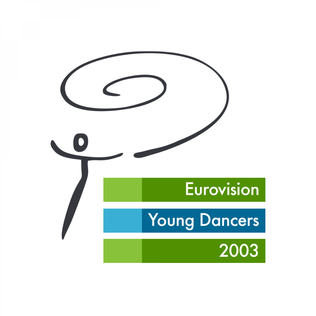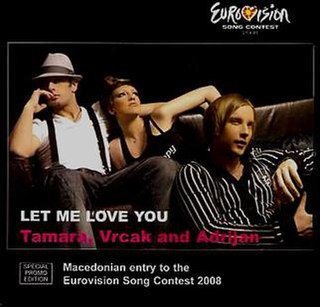
The Eurovision Young Dancers 2003 was the tenth edition of the Eurovision Young Dancers, held at the Stadsschouwburg Theatre in Amsterdam, Netherlands between 29 June and 4 July 2003. Organised by the European Broadcasting Union (EBU) and host broadcaster Nederlandse Programma Stichting (NPS), dancers from ten countries participated in the televised final. A total of seventeen countries took part in the competition therefore a semi-final was held a few days before at the same venue. Armenia and Romania made their début while Austria, Germany and Ireland decided not to participate.

Eurovision Young Dancers, often shortened to EYD, or Young Dancers, was a biennial dance competition, organised by the European Broadcasting Union (EBU) and is broadcast on television throughout Europe. Thirty-seven countries have taken part since the inauguration of the contest in 1985; including Kosovo and Canada.

Switzerland has participated in the Eurovision Song Contest 63 times since making its debut at the first contest in 1956, missing only four contests, in 1995, 1999, 2001 and 2003. Switzerland hosted the first contest in 1956 in Lugano, and won it. Switzerland won the contest again in 1988, with the 1989 contest being held in Lausanne.

Switzerland participated once in the Junior Eurovision Song Contest in 2004. Radiotelevisione svizzera (RSI), a member organization of the multilingual Swiss Broadcasting Corporation and the European Broadcasting Union (EBU), were responsible for the selection process of their participation. The only representative to participate for the nation was Demis Mirarchi with the song "Birichino", which finished in sixteenth place out of eighteen participating entries, achieving a score of four points. Switzerland did not compete in subsequent editions due to financial difficulties.

Eurovision Young Musicians, often shortened to EYM, or Young Musicians, is a biennial classical music competition for European musicians that are aged between 12 and 21. It is organised by the European Broadcasting Union (EBU) and broadcast on television throughout Europe, with some countries holding national selections to choose their representatives for the contest.

"Vo ime na ljubovta" is a song by Tamara Todevska, Vrčak and Adrian Gaxha, who competed with it at Skopje Fest 2008. The song won, having been awarded the most televotes by the general public and the 7-member expert jury, and an English-language version represented Macedonia at the 2008 Eurovision Song Contest in Belgrade, Serbia, on 22 May 2008.

Germany has officially participated in the biennial classical music competition Eurovision Young Musicians 18 times since its debut in 1982, winning the inaugural contest that year. Before German reunification in 1990, it was presented as West Germany, representing the Federal Republic of Germany. East Germany did not compete. Germany won again in 1996 and have hosted the contest twice, in 2002 and 2014.

Poland has participated in the Eurovision Young Musicians 14 times since its debut in 1992 and has won the contest three times to date. Poland hosted the contest in 1994.

The Czech Republic has participated in the biennial classical music competition Eurovision Young Musicians eight times since its debut in 2002, winning the contest for the first time in 2022.

Sweden has participated in the Eurovision Young Dancers 15 times since its debut in 1985. Sweden has hosted the contest once, in 1993 and jointly won the contest in 2003. Sweden is also the only country that has participated in every edition.

Malta has participated in the Eurovision Young Dancers 2 times since its debut in 2015. On 7 July 2015, PBS Malta, which is responsible for Malta's participation confirmed that Malta will host the 2017 edition. However, in January 2017, the EBU announced that PBS had due to circumstances beyond their control been forced to cancel their staging of the competition. Nevertheless, they will still take part in the contest.

The Czech Republic has participated in the Eurovision Young Dancers 7 times since its debut in 1999. The Czech Republic has hosted the contest twice, in 2015 and in 2017.

Norway has participated in the Eurovision Young Dancers 13 times since its debut in 1985. Norway has hosted and won the contest once, in 2011.

Cyprus has participated in the Eurovision Young Dancers 9 times since its debut in 1989. Cyprus is one of the poorest performing countries in the contest, with no finals appearances.

Spain has participated in the Eurovision Young Dancers eight times since its debut in 1985, most recently taking part in 1999. Spain is the most successful country in the contest, with a total of five wins.

France has participated in the Eurovision Young Dancers 7 times since its debut in 1985. France has hosted the contest twice, in 1989 and 1999.

Poland has participated in the Eurovision Young Dancers 11 times since its debut in 1993. Poland has hosted the contest a record three times, in 1997, 2005 and 2013, and has won the contest three times. On 5 September 2016, Polish broadcaster Telewizja Polska (TVP) confirmed they would participate again in 2017.

The United Kingdom has participated in the Eurovision Young Dancers 7 times since its debut in 1985, most recently taking part in 2005. The UK has hosted the contest once, in 2001 and jointly won the contest in 1989.

Switzerland has participated in the Eurovision Young Dancers 9 times since its debut in 1985. Switzerland has hosted the contest once, in 1995.

Estonia has participated in the Eurovision Young Dancers 4 times since its debut in 1993.
















